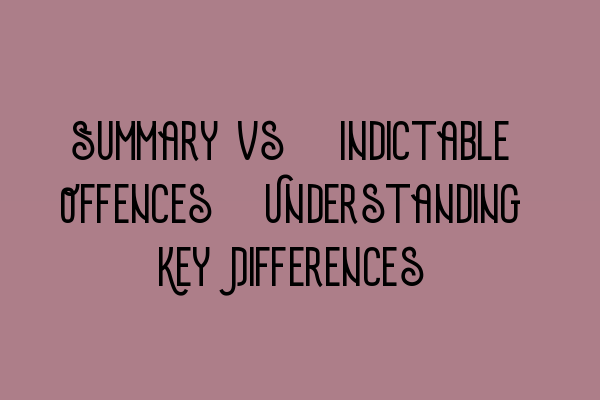Summary vs. Indictable Offences: Understanding Key Differences
As criminal solicitors at SQE Criminal Law & Practice Law UK, it is crucial for us to have a deep understanding of the legal system, including the classification of offences. One of the fundamental distinctions in criminal law is between summary and indictable offences. In this blog post, we will explore the key differences between these two types of offences and shed light on their implications in legal proceedings.
The Definition of Summary Offences
Summary offences, also known as minor offences, are less serious criminal offences which are generally tried in the lower courts, such as the Magistrates’ Court. These offences are considered to be less complex in nature and do not warrant a trial by jury.
Common examples of summary offences include public order offences, minor theft, and traffic violations. The penalties for summary offences are typically limited to fines or community service, although short-term imprisonment may also be a possibility.
It is important to note that not all offences can be classified as summary offences. Some offences, due to their nature or severity, are dealt with as indictable offences.
The Definition of Indictable Offences
Indictable offences, also referred to as serious offences, are more severe criminal offences that require further investigation and are tried in the higher courts, such as the Crown Court. These offences are usually more complex in nature and carry heavier penalties.
Examples of indictable offences include murder, rape, and large-scale fraud. These offences often require a trial by jury, where the guilt or innocence of the accused is determined by a group of impartial individuals.
The penalties for indictable offences are typically more severe and can include lengthy imprisonment, significant fines, or a combination of both. The trial process for indictable offences is generally more formal and structured compared to summary offences.
Key Differences
Now that we have explored the definitions of summary and indictable offences, let’s delve into the key differences between the two:
1. Mode of Trial: Summary offences are generally tried in the lower courts, such as the Magistrates’ Court, while indictable offences are tried in the higher courts, such as the Crown Court.
2. Jury Trial: Summary offences do not usually require a trial by jury, whereas indictable offences often involve a trial by jury where the decision is made by a panel of impartial individuals.
3. Complexity: Summary offences are relatively less complex compared to indictable offences. Summary offences are often straightforward and may not require extensive investigation or legal arguments.
4. Penalties: Summary offences carry less severe penalties, such as fines or community service, while indictable offences can result in significant fines, lengthy imprisonment, or a combination of both.
5. Legal Representation: Due to the differences in complexity and potential penalties, individuals accused of indictable offences are more likely to seek legal representation, such as the services offered by SQE Criminal Law & Practice Law UK, to ensure a strong defense.
Conclusion
Understanding the key differences between summary and indictable offences is essential for anyone involved in the criminal justice system. As criminal solicitors at SQE Criminal Law & Practice Law UK, we are well-versed in handling both types of offences and providing expert legal advice to individuals facing criminal charges.
If you have any questions or require legal representation for a summary or indictable offence, please contact SQE Criminal Law & Practice Law UK. We offer comprehensive SQE 1 and SQE 2 preparation courses to equip aspiring solicitors with the necessary knowledge and skills to excel in their legal careers.
